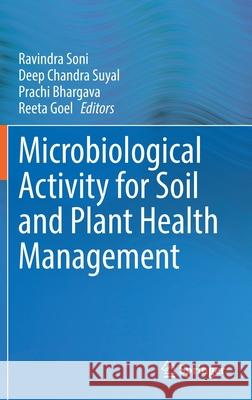Microbiological Activity for Soil and Plant Health Management » książka



Microbiological Activity for Soil and Plant Health Management
ISBN-13: 9789811629211 / Angielski / Twarda / 2021 / 822 str.
Microbiological Activity for Soil and Plant Health Management
ISBN-13: 9789811629211 / Angielski / Twarda / 2021 / 822 str.
(netto: 898,34 VAT: 5%)
Najniższa cena z 30 dni: 886,75
ok. 16-18 dni roboczych.
Darmowa dostawa!
Chapter 1. Agriculturally important microbes –– Challenges and Opportunities.- Chapter 2. Agriculturally Important Microorganism: Understanding the Functionality and Mechanisms for Sustainable Farming.- Chapter 3. Microbial Diversity of Different Agroecosystems: Current Research and Future Challenges.- Chapter 4. Soil Microbial Biomass an Index of Soil Quality and Fertility in Different Land Use Systems of Northeast India.- Chapter 5. Microbes and Plant Mineral Nutrition.- Chapter 6. Drought Stress Alleviation in Plants by Soil Microbial Interactions.- Chapter 7. Role of Nitrogen-Fixing Microorganisms for Plant and Soil Health.- Chapter 8. Serendipita indica mediated drought and heavy metal stress tolerance in plants.- Chapter 9. Role of rhizosphere and endophytic microbes in alleviation of biotic and abiotic stress in plants.- Chapter 10. Augmentation of plant salt stress tolerance by microorganisms.- Chapter 11. Impact of Plant Exudates on Soil Microbiomes.- Chapter 12. Global climate change and microbial ecology: Current scenario and management.- Chapter 13. Biotic stress management by microbial interactions in soils.- Chapter 14. Interactions between plant genotypes and PGPR are a challenge for crop breeding and improvement inoculation responses.- Chapter 15. Significance of Microbial Enzyme Activities in Agriculture.- Chapter 16. Omics technology for plant stress management.- Chapter 17. Rhizosphere modeling and engineering for agricultural and environmental sustainability.- Chapter 18. Factors Affecting Soil Ecosystem and Productivity.- Chapter 19. Microbial Genes, Enzymes, and metabolites: to improve rhizosphere and Plant Health Management.- Chapter 20. Recent trends in organic farming.- Chapter 21. Advances in Microbial Applications in Safeguarding of Plant Health: Challenges and Future Perspective.- Chapter 22. Rhizosphere Modelling and Nanotechnology: New Outlooks in Sustainable Agriculture.- Chapter 23. New strategies for commercialization of microbial technologies.- Chapter 24. Techniques for improving microbial inoculants as a tool for sustainable development.- Chapter 25. Bioinoculants for Agricultural Sustainability.-
Dr. Ravindra Soni is an Assistant Professor at the Department of Agricultural Microbiology, I.G.K.V., and Raipur, India. He has more than 11 years of teaching & research experience in the field of agricultural microbiology, microbial ecology, molecular biology & biotechnology. He is a recipient of the DST- Young Scientist award from SERB, Department of Science & technology, India. He was also selected for Ugc-Ds Kothari Postdoc Fellowship and Insa summer Fellowship. He has published edited books, lab manual, several research articles and chapters in reputed international journals and books.
Dr. Deep Chandra Suyal is an Assistant Professor at the Department of Microbiology, Akal College of Basic Sciences, Eternal University, Baru Sahib, Himachal Pradesh, India. He has been actively engaged in research for 10 years, and has experience in the fields of agricultural microbiology, molecular biology & biotechnology and metagenomics. He is currently investigating the genomics & proteomics of cold adapted microorganisms. He has published numerous articles and books with reputed international journals and publishers. He has three patents in his credit.
Dr. Prachi Bhargava has over 16 years of teaching and research experience in microbial molecular biology and is currently working as an Associate Professor at Shri Ramswaroop Memorial University, Lucknow. She has worked as Principal Investigator on various major Government of India sponsored projects, and was recently involved in a project sponsored by SERB, New Delhi. As an active researcher, Dr Bhargava has published numerous research and review articles in respected journals, along with several book chapters. She has also co-edited two books with renowned publishers.
Dr. Reeta Goel is a Professor and former Head of the Department of Microbiology, G. B. Pant University of Agriculture & Technology, Uttrakhand, India. She has also served as visiting scientist at various institutes in the USA and has more than 35 years of teaching and research experience in the area of plant-microbe interactions, microbial ecology, bio-degradation and metagenomics, especially with reference to higher altitudes. She has worked extensively in the field of genomics and proteomics of cold adapted microorganisms. She has published over 100 research articles, book chapters and edited books. She has six patents to her credit, including one U.S. Patent, and received numerous awards for her contributions to science & technology. Presently, serving as distinguished Professor at GLA UNIVERSITY, MATHURA, UP (India) after her retirement.
Plants and the soil they grow in, are confronted with severe biotic and abiotic stresses viz. nutrient starvation, salt stress, drought, flooding, xenobiotic contamination, in order to sustain in an ecosystem. They also shape the microbial composition in their vicinity by modulating their secretions. This book discusses the pressing demand for novel and potential microorganisms to support an environment-friendly and cost-effective way of stress management in the plants. The book summarizes the processes and mechanisms involved in microbe-assisted plant and soil stress management. It discusses the challenges and opportunities in the application of microbial interactions in plant health. It describes in detail the nutrient dynamics of different soil systems. It includes important topics like agriculturally important genes and enzymes, rhizosphere modeling & engineering, genetically engineered bio-inoculants etc. It also talks about the application of next-generation technologies, omics and nano-based technologies. In the recent years, more than 50% of agricultural production relies on chemical fertilizers, leading to serious health issues and environmental concerns. This book provides natural solutions to these environmental concerns.
This book is useful for researchers and students in the field of microbiology, agriculture, soil biology and plant sciences.
1997-2026 DolnySlask.com Agencja Internetowa
KrainaKsiazek.PL - Księgarnia Internetowa









